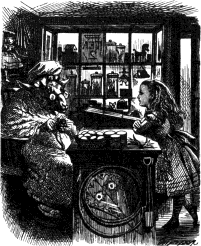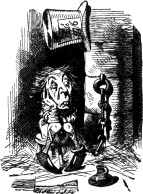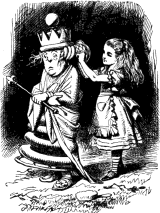Living Backwards (First Half of Wool and Water)
Studies in Alice XVII, by Marc Edmund Jones This lesson considers the first half of the fifth chapter of
Through the Looking-Glass to where the queen becomes the
sheep and the seventeenth great principle of wisdom in the
Philosophy of Concepts as revealed through the adventures of
Alice is that effect exists in order to make cause real. This of
course is one of the many seeming paradoxes in any analysis of
the eternal principles but the paradox is not genuine.
Everything is cognized through the agency of a point of view,
and under ordinary circumstances an effect is considered as the
purposeless or accidental result of cause or seen as of no
importance of and by itself unless it might happen to be the
cause of something else as usually is the case. A normal point
of view of life accepts an existence that is wholly purposeless
as far as any concrete or definite consideration is concerned,
and while there may be a general realization of abstract or spiritual goals of humanity the fact
remains that civilization is thoroughly committed to its accidental hypothesis. Effects are
allowed therefore to become a negative factor in social philosophy. Man generally remains
baffled by the circumstances surrounding him. But if effects were seen to possess real purpose
from a utilitarian point of view the entire problem of life would be brought within the bounds of
solution. There may seem to be a very fine shade of distinction here but it is an alteration in a
fundamental point of view that is of far reaching consequences to a seeker. It is not the factor of
cause that is of vital importance to man but the reality or whatever actually is created by the
effect. Thus a stone is thrown and this act varies to a vast extent in reality of consciousness due
entirely to the circumstances of the stone striking certain objects or failing to do so. The
principle is nowhere brought out as vitally as in the matter of punishment. When people are
penalized for effects as the commission of crime the result in general is the encouragement of the
cause that has been penalized. A vicious circle results. Effect strengthens rather than dissipates
cause, and effort directed on effects always intensifies cause as for example in the case of blood
feud.
This lesson considers the first half of the fifth chapter of
Through the Looking-Glass to where the queen becomes the
sheep and the seventeenth great principle of wisdom in the
Philosophy of Concepts as revealed through the adventures of
Alice is that effect exists in order to make cause real. This of
course is one of the many seeming paradoxes in any analysis of
the eternal principles but the paradox is not genuine.
Everything is cognized through the agency of a point of view,
and under ordinary circumstances an effect is considered as the
purposeless or accidental result of cause or seen as of no
importance of and by itself unless it might happen to be the
cause of something else as usually is the case. A normal point
of view of life accepts an existence that is wholly purposeless
as far as any concrete or definite consideration is concerned,
and while there may be a general realization of abstract or spiritual goals of humanity the fact
remains that civilization is thoroughly committed to its accidental hypothesis. Effects are
allowed therefore to become a negative factor in social philosophy. Man generally remains
baffled by the circumstances surrounding him. But if effects were seen to possess real purpose
from a utilitarian point of view the entire problem of life would be brought within the bounds of
solution. There may seem to be a very fine shade of distinction here but it is an alteration in a
fundamental point of view that is of far reaching consequences to a seeker. It is not the factor of
cause that is of vital importance to man but the reality or whatever actually is created by the
effect. Thus a stone is thrown and this act varies to a vast extent in reality of consciousness due
entirely to the circumstances of the stone striking certain objects or failing to do so. The
principle is nowhere brought out as vitally as in the matter of punishment. When people are
penalized for effects as the commission of crime the result in general is the encouragement of the
cause that has been penalized. A vicious circle results. Effect strengthens rather than dissipates
cause, and effort directed on effects always intensifies cause as for example in the case of blood
feud.
Here is the principle of potentiality or genuine power in being and in outer manifestation. Real
cause follows its own effect for the reason that reality is a function of higher realm of
consciousness. Volitional act and desire or cause seem to precede effect and indeed do so in all
superficial and conventional outer circumstances of life. The point of view here is wholly
mundane, and reality is centered in the realm of sense. To perception of this grade all
superphysical phenomena are inexplicable and creation in general is baffling. But as reality is
added to cause there is added a foreshadowing that far from being occult or spiritualistic is
merely manifestation of a proper self-sustaining actuation. Where the reality in cause is greatest,
as in marked poignancy of desire, the effect may become manifest long in advance. And by
reciprocal co-operation in and among all things it is possible in time for
an aspirant to utilize all outer circumstances as effects of a cause that as
inherent in himself gives power and increased reality.
The symbolism of this section of the fifth chapter in Looking-Glass is therefore interesting in the portrayal of the Mad Hatter in prison. Limitation or imprisonment comes first as sensation, then the trial as realization is second and finally the crime as action. Thus the unthinking man in life actually feels himself pushed or impelled into the commission of acts that are at the moment quite contrary to his real wishes. To say that such a crime is an effect of precedent stirrings in consciousness is a common quibble that leads to endless searching for causes and arrives at last back to God. But to see the crime or the tangible element in any given instance as the cause rather than the effect is to give reason and meaning to the elements that have created the reality. Reality is an attribute of effect rather than cause. Were this not so the function of effect would be nonreality or illusion and the universe would be self-destroying. This is exceedingly difficult metaphysics but it serves to free the fundamental point of view of an aspirant from the bondage of time and space.
The achievement of imagination in the chapter, or the seventeenth great scientific anticipation, is the revelation here of the principles of public relation or the new business and social science that deals with the weight of popular opinion. Propaganda is no new detail of civilization. The vast circuses and glorious holidays of ancient conquerors were designed wholly for the purpose of awakening popular support for the ruler and his dynasty in connection with some special project of interest to him. Manifestos and proclamations have always sought to serve the same purpose fundamentally. Rulership by sheer imposition of a strong will of a leader has seldom been successful in history as to make very surprising indeed the common belief that mere passage of a law, election or appointment of a certain individual will be sufficient to bring about any given result. The churches or temples in the worships of all ages have been designed subconsciously if not consciously to mold the heart of mankind and in many instances the churches have done this most scientifically. The schools, since their separation from ecclesiastical authority, have been designed similarly to mold the mind of man. In the modern world both corporations and general organizations have learned the necessity for maintaining a department of public relations.
 The symbolism of the white queen is an apt anticipatory presentation
of the principles of prereality or of the establishment of control over
effect and the consequent deliberate manipulation of reality. In
general this might be described as no more than building a buffeting
consciousness or preparing the self within the consciousness for all
eventualities. This would be the superficial explanation far easier to
teach and present to the world than the metaphysical analysis of the
earlier paragraphs of this lesson. But an aspirant must see that power
of anticipation is a living power and that it is potentiality of
self-sustaining cause itself. The screaming before hurt is of course
merely the rather remarkable dramatization of the principle by the
supernormally wise subconscious or mathematical faculties of Lewis
Carroll. The shawl curiously suggests the libido of man and the pins the pricking by which
consciousness operates.
The symbolism of the white queen is an apt anticipatory presentation
of the principles of prereality or of the establishment of control over
effect and the consequent deliberate manipulation of reality. In
general this might be described as no more than building a buffeting
consciousness or preparing the self within the consciousness for all
eventualities. This would be the superficial explanation far easier to
teach and present to the world than the metaphysical analysis of the
earlier paragraphs of this lesson. But an aspirant must see that power
of anticipation is a living power and that it is potentiality of
self-sustaining cause itself. The screaming before hurt is of course
merely the rather remarkable dramatization of the principle by the
supernormally wise subconscious or mathematical faculties of Lewis
Carroll. The shawl curiously suggests the libido of man and the pins the pricking by which
consciousness operates.
The law of applied psychology or the seventeenth big idea for the solution of personal problems is brought out here in the technique of suggestion. Nothing ever starts or launches itself but rather an appeal to the sustaining higher reality is always needed. The white queen's offer to employ Alice thus brings out the points. Under spiritual law, to suggest anything is to be assigned to do that thing and by this suggestion life's opportunities are created. Jam every other day is life's promise. Believing impossible things is a clever symbolization of the expansion of consciousness. Memory's working both ways is clairvoyance. The student must learn to CREATE OPPORTUNITY for himself. Reminiscent of the apples of the Hesperides, only self can give to self the jam for today. The present is always within control, and through the manipulation of the present the past and future are mastered completely.

Sabian.org





